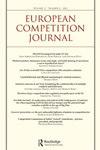An inverse analysis of the digital markets act: applying the Ne bis in idem principle to enforcement
Q2 Social Sciences
引用次数: 2
Abstract
ABSTRACT On 18 July 2022, the Council gave its final approval of the Digital Market Act’s final text. Notwithstanding the amendments following the initial proposal published by the European Commission on 15 December 2020, the main objectives of the DMA have remained untouched and separate from the objectives pursued by competition rules. In the interim, the Court of Justice of the European Union (CJEU) issued its preliminary rulings on the bpost and Nordzucker cases, with particularly relevant consequences concerning the application of the double jeopardy principle. The potential remedies and obligations imposed on the main digital platforms both under Articles 5 to 7 of the DMA and under competition law rules will overlap and create a risk of incoherent enforcement, especially on the side of the European Commission. Against this background, the paper strives to draw out the narrow enforcement gap left for competition authorities. In addition, the paper highlights a number of alternatives open to competition authorities when enforcing competition law rules on digital markets, namely the segmentation of its enforcement efforts depending on the type of service concerned in each case.《数字市场法》的逆向分析:将一罪不二审原则应用于执行
2022年7月18日,理事会最终批准了《数字市场法案》的最终文本。尽管在欧盟委员会于2020年12月15日公布的初步提案之后进行了修订,但DMA的主要目标保持不变,并与竞争规则所追求的目标分开。在此期间,欧洲联盟法院(欧洲法院)就bpost和Nordzucker案件发表了初步裁决,对双重危险原则的适用产生了特别相关的影响。根据DMA第5条至第7条以及竞争法规则,对主要数字平台施加的潜在补救措施和义务将重叠,并造成执法不连贯的风险,尤其是在欧盟委员会方面。在此背景下,本文力求找出留给竞争主管部门的狭窄执法差距。此外,本文还强调了竞争管理机构在执行数字市场竞争法规则时可以选择的一些替代方案,即根据每种情况下所涉及的服务类型对执法工作进行细分。
本文章由计算机程序翻译,如有差异,请以英文原文为准。
求助全文
约1分钟内获得全文
求助全文
来源期刊

European Competition Journal
Social Sciences-Law
CiteScore
1.50
自引率
0.00%
发文量
12
期刊介绍:
The European Competition Journal publishes outstanding scholarly articles relating to European competition law and economics. Its mission is to help foster learning and debate about how European competition law and policy can continue to develop in an economically rational way. Articles published in the Journal are subject to rigorous peer review by leading experts from around Europe. Topics include: -Vertical and Conglomerate Mergers -Enlargement of the Union - the ramifications for Competition Policy -Unilateral and Coordinated Effects in Merger Control -Modernisation of European Competition law -Cartels and Leniency.
 求助内容:
求助内容: 应助结果提醒方式:
应助结果提醒方式:


